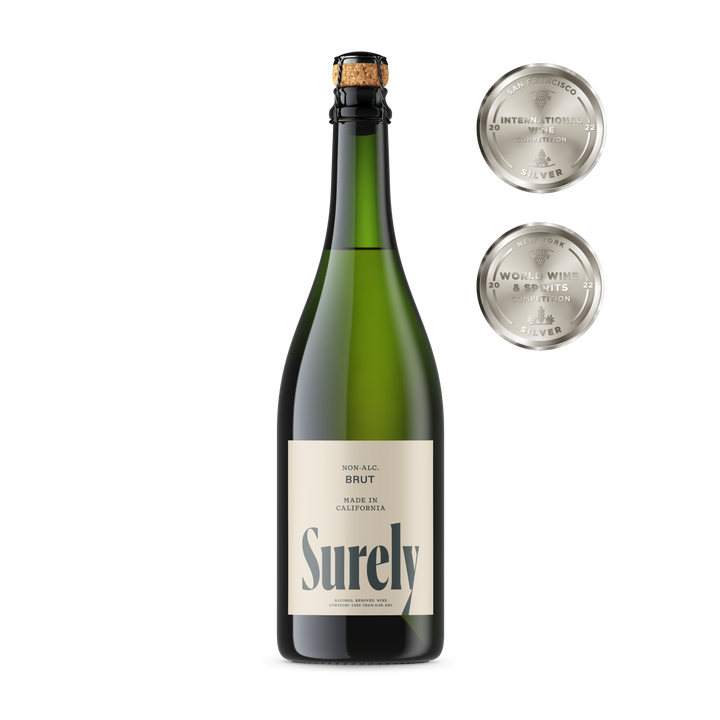Alcohol can do a number on your gut even if you don’t suffer from Irritable Bowel Syndrome (also known as IBS). If you have IBS and indulge in alcohol, especially the wrong kinds of alcohol, you could trigger some truly regrettable symptoms.
There is hope, though, especially for wine lovers with IBS! You just have to know what types of wine are less likely to irritate your gut if you suffer from this gastrointestinal disorder.
There is no one-size-fits-all when it comes to IBS sufferers and alcohol. However, learning which wines are safe lets you indulge in a glass or two without stressing about an IBS flare-up.
Table of Contents
Can I Drink Alcohol if I Have IBS?
How Wine (and Alcohol in General) Affects IBS
What is the Best Wine to Drink with IBS?
How Does Wine Compare to Other Alcohol for IBS?
What is IBS?
IBS is a chronic gut condition that causes disruptive symptoms like constipation (IBS-C), diarrhea (IBS-D), or a mixture of both (IBS-M). According to the American College of Gastroenterology, it impacts at least 10% of the population worldwide and up to 15% in the United States.
We don’t know the exact causes of IBS. Evidence-based research shows that an imbalance in gut microbiota, nervous system conditions, mental health conditions, stress, and dysmotility (changes in how your GI muscles contract) can all contribute to IBS.
Symptoms of IBS include:
- Abdominal pain or cramping
- Bloating or excess gas
- Irregular bowel movements
- Sudden urges to use the bathroom
- Mucus in your stool
- Diarrhea, constipation, or a combo of both
Triggers can vary person by person, but common IBS triggers include emotional stress, smoking, medications, and certain foods or drinks. Some research suggests sex hormones are at play, too, since IBS affects more women than men, especially around menstruation.
Can I Drink Alcohol if I Have IBS?
Alcohol is a common trigger for IBS symptoms, so it’s usually best to avoid all alcohol (at least for a period of time) if you have IBS. Heavy drinking, in particular, can greatly increase your risk of diarrhea after drinking.
Every body is different. Some people find that drinking low-FODMAP alcohols, such as most hard liquors, dry, low sugar wines, and beer, don’t trigger their symptoms. Other IBS sufferers discover that any form of alcohol makes their IBS worse.
Soyona Rafatjah, MD, of PrimeHealth, told us that alcohol of all kinds is one of the beverages most likely to trigger IBS symptoms. She and her team recommend adding it to the “no-fly” list of IBS trigger foods.
To know if you can drink alcohol without triggering IBS symptoms, first take a four-week break from all drinking. Then, try a single serving of a low-FODMAP alcohol, like your favorite dry red wine, and observe how it impacts your symptoms.
How Wine (and Alcohol in General) Affects IBS
Alcohol consumption can affect your gut in a few different ways. It can increase stomach acid production and act as an irritant on your stomach lining. It can mess with nutrient absorption and disrupt the balance of good and bad bacteria in your gut.
All of this isn’t just bad for IBS. It’s bad for anyone with other GI conditions like gastroesophageal reflux disease (GERD), celiac disease, and Crohn’s. Those effects also explain alcohol-induced diarrhea.
Some IBS sufferers don’t drink alcohol at all because they find it’s not worth the digestive tract issues. Staying sober certainly has its perks: zero hangovers, potential weight loss, and improved skin.
Others aren’t so willing to give up the simple pleasure of a glass of wine with dinner or a fun cocktail on vacation. For them, drinking low FODMAP alcohol in moderation means that they can have their wine and not suffer, too.
A Low-FODMAP Diet and IBS
A proper diet plays the biggest role in reducing IBS flare-ups. Doctors typically start with a low-FODMAP diet for both IBS patients and those with small intestinal bacterial overgrowth (SIBO). As alcohol affects the gut tremendously, a low-FODMAP diet eliminates it altogether.
FODMAP stands for "Fermentable Oligosaccharides, Disaccharides, Monosaccharides and Polyols.” Research shows that FODMAP foods (and alcoholic beverages) that fall into these categories aren’t absorbed as well by your small intestine and can irritate the large intestine.
That can lead to excess gas, bloating, and stomach pain, all classic IBS symptoms.
As Dr. Rafatjah puts it, “People with IBS should follow a low-FODMAP diet for fewer than two months to reduce IBS symptoms. After that period, it’s important to reintroduce healthy prebiotic foods and develop a less restrictive diet you can manage as your gut heals.”
To follow a low-FODMAP diet, try an app to keep track of foods to eat and avoid.
What is the Best Wine to Drink with IBS?
According to Dr. Rafatjah, the best wine to drink with IBS is a dry, low-sugar wine. Dry wines are the lowest in FODMAPs, and it’s even better to drink a dry, non-alcoholic wine to take it easy on your digestive system.
Non-Alcoholic Sparkling Brut

$24.99
Award-winning alcohol-removed bubbly white. Hints of apple, pear, honey and citrus notes. Better than champagne.TASTING NOTES: The vibrant combination of apple, pear, honey and citrus notes intertwined with a crisp backbone. The acid and sweet notes of the fruit pair… Read More
There is no such thing as a true sugar-free wine, but you can find wines without added sugar or lower in sugar.
Low-sugar reds include Pinot Noir, Cabernet Sauvignon, and Merlot. Most dry white wines like chardonnay, Sauvignon Blanc, and Pinot Grigio are naturally low in sugar. Dry sparkling wines are an option if your stomach is fine with fizz.
How Does Wine Compare to Other Alcohol for IBS?
Some IBS sufferers find that any amount of alcohol triggers their symptoms. For others, certain types of alcohol are better than others, especially if they’re sensitive to gluten and certain carbohydrates.
| IBS and Alcohol | |||
| Type of Alcohol | Low-FODMAP | Gluten-free* | Low-Sugar |
| Dry Wine | Yes | Yes | Yes |
| Dessert Wine | No | Yes (but check for additives) | No |
| Fortified wine | No | Yes | No |
| Beer | Yes | No | Yes (if it’s light beer) |
| Cider | No | Usually | No |
| Spirits | Yes (with the exception of rum) | Yes | Yes |
*There may be trace amounts of gluten even in naturally gluten-free beverages like wine. It’s unlikely (but not impossible) that someone with celiac disease would react to trace levels of gluten. Look for certified gluten-free labels or check with the winery if you’re concerned.
Here are some of the best alcoholic drinks to start with when determining through trial and error what drinks are safe for your type of IBS:
Wine
Dry red and white wines are better for those with IBS than wines with a lot of residual sugar. That includes some lower-quality wines and dessert wines.
Sparkling wines may be an OK option if bubbles don’t give you bloat. Some carbonated drinks can have that effect, but it’s not true for everyone.
Avoid fortified wines like port and sherry. They contain high levels of fructose. That’s just a fancy word for natural sugars found in fruit, fruit juices, some vegetables, and honey.
Beer
Beer is a low-FODMAP alcoholic drink. If you’re sensitive to gluten or carbonation, though, it’s best to avoid it.
Cider
Hard ciders generally include high-FODMAP fruits like apples or pears and should be avoided. Berry-based ciders are better, but they’re still a high-sugar beverage. The fizz isn’t great for some with digestive issues, either.
Spirits
Distilled spirits like vodka, gin, and whiskey are low-FODMAP options and could be worth trying. Rum is an exception because of its high fructose content, so you may need to skip some of those umbrella drinks or swap the rum for vodka.
Mixers
You should watch your mixers, too. Zero-sugar seltzers and club sodas are usually fine unless you’re sensitive to carbonation. Cranberry juice and a spritz of most citrus fruits are low-FODMAP options worth trying.
Our Tips for Drinking Alcohol with IBS
If you discover that moderate alcohol intake doesn’t trigger your IBS, keep it that way by never binge drinking. That means no more than one standard drink (a 5-ounce glass of wine) per day for women and 2 drinks per day for men.
If you’re drinking a higher-ABV wine, you should reduce that pour even further.
Bonus: This is great for overall wellness, not just IBS symptoms.
Here are a few more tips:
- Be mindful about your drinking. Mindful drinking is about being intentional about alcohol. We’ve talked about the threshold for moderation, but skipping days on a regular basis is a good call, too. Think about why you drink when you drink. Get reflective.
- Drink more water. Incorporate a glass of water between cocktails if you have more than one. You’ll slow yourself down and stay hydrated, which is vital if you have IBS.
- Monitor your symptoms. If you have a bout of tummy troubles after a round of sangrias, it’s not all in your head. You’ve just nailed down another IBS trigger. Keep a food diary to monitor your symptoms, so you have evidence of what you can and can’t tolerate.
- Watch your mixers. Fruit juices and sodas that are high in fructose (or, even worse, high fructose corn syrup) aren’t great for digestive symptoms. Stick with lower-sugar options like seltzers or cranberry juice.
- Talk to your doctor. At the end of the day, you know your body best. Your doctor probably knows your body second best. Before starting a new “healthy” drinking plan to relieve IBS symptoms, talk to your doctor, especially if you’re on medications.
- Choose non-alcoholic options. If it’s the alcohol giving your gut grief, sub in some delicious non-alcoholic alternatives at your next happy hour. Dealcoholized wine is an excellent place to start.
Frequently Asked Questions
Can I drink wine with IBS?
You can drink wine with IBS if wine isn’t an IBS trigger for you. Start by eliminating wine from your diet for at least 4 weeks, then reintroducing it to see if your symptoms flare.
Regardless of how it impacts your symptoms in the short term, keep your alcohol intake moderate. Heavy drinking can increase your risk of a variety of conditions long-term, including sustained GI issues.
Is red wine good for IBS?
Dry red wines, like Pinot Noir, Cabernet Sauvignon, and Merlot, are less likely to trigger IBS symptoms than varietals with more sugar. However, red wine isn’t necessarily “good” for IBS — even its power antioxidant, resveratrol, doesn’t offer any particular benefits for IBS sufferers.
Does white wine make IBS worse?
Depending on the person, white wine may make IBS symptoms worse. Dry white wines, like chardonnay, Sauvignon Blanc, and Pinot Grigio, are the lowest in sugar and FODMAPs. But, some people find that any wine triggers gut symptoms.
To find out if white wine makes your IBS worse, take a break from drinking for at least 4 weeks, then reintroduce a single glass of white wine to see if it acts as a gut irritant.
Can you drink wine while on IBS medication?
You can drink wine while on IBS medication if your doctor gives you the go-ahead. Certain drugs are less effective when paired with alcohol. It’s one of those things that really depends on your unique medication regimen.
If you’re on antidepressants for your IBS, for example, drinking is strongly discouraged because it can amplify the effects of alcohol or any existing mental health concerns.
Real Wine That’s Alcohol-Free and Low-Sugar
Managing IBS is hard enough without worrying about what you’ll sip on at your next get-together. The good news is that non-alcoholic wines like Surely are a delicious alternative that don’t even feel like a compromise.
Start with non-alcoholic sparkling rosé, an effervescent option with just a single gram of added sugar. It comes in cans, too, in case you’d like your bubbles on the go.
Sources
- The epidemiology of irritable bowel syndrome
- Irritable bowel syndrome, the microbiota and the gut-brain axis
- Sex-Gender Differences in Irritable Bowel Syndrome
- Relationship between Patterns of Alcohol Consumption and Gastrointestinal Symptoms among Patients with Irritable Bowel Syndrome
- Antidepressants for irritable bowel syndrome



![What Happens When You Stop Drinking [Timeline + Benefits]](https://dropinblog.net/cdn-cgi/image/fit=scale-down,width=700/34240221/files/featured/what-happens-when-you-stop-drinking.jpg)
